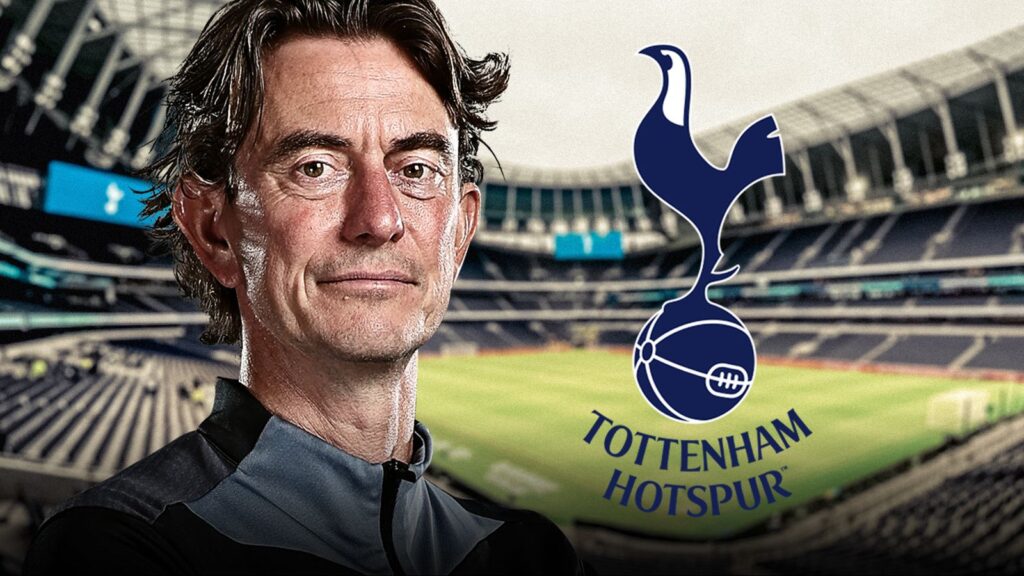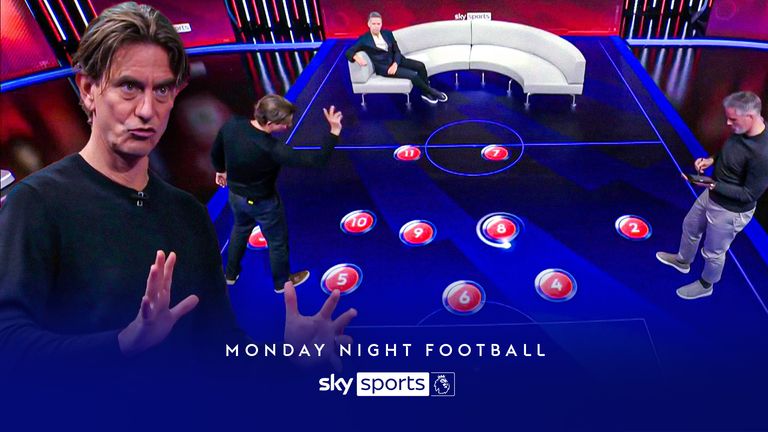When you sit down with Thomas Frank for a one-on-one chat or in a press conference, you always get honesty and insight rarely seen in the game.
For this journalist, the most recent meeting with the Dane was no different. It was late April, which has ended up being Frank’s final one-on-one chat with Sky Sports as Brentford’s head coach. Given that context, there was one line that stood out.
“We’ve got patience at Brentford, which is a word that you probably can’t say in football. I think you need to have it,” Frank said.
Frank’s appreciation of patience makes his move to Tottenham a career gamble. Just look at the last four permanent Spurs managers hired by Daniel Levy.
Jose Mourinho was sacked on the eve of a cup final, while his replacement Nuno Espirito Santo – who made a jump from Wolves, one similar to the move Frank is facing now – lasted just 17 games.
Then serial winner Antonio Conte left Spurs after an explosive press conference in which he took aim at his own club. Even though Ange Postecoglou delivered a long-awaited trophy and Champions League football, albeit via a 17th-place finish in the league, that still was not enough. Not much room for patience there.
Compare that to what Frank had at Brentford. His six-year spell is the third-longest current tenure in England’s top four divisions, behind Harrogate Town’s Simon Weaver and Manchester City’s Pep Guardiola.
He has regularly described his job in west London as “the best in football” given the support he has from the owners and the unified support from the fanbase – creating a lack of jeopardy in the role.
Even though Frank has support from within the Spurs board in Johan Lange – with whom he worked at Danish club Lyngby – he arrives at a club where Postecoglou’s shadow, success and popularity looms large in the fanbase.
Frank also enters a Spurs dressing room who were public in their support for his predecessor. “Him continuing would be good for the dressing room,” said Pedro Porro about Postecoglou, while James Maddison, Lucas Bergvall and Archie Gray all backed the Australian for a third season.
It begs the question: what do Spurs see in Frank – who has no experience managing Champions League football – that the popular Postecoglou could not deliver?
‘I have plan B and plan C’
One factor is a clear sense of tactical flexibility from the Brentford boss. Postecoglou’s insistence to stick with his way of playing was admirable at first – but it ultimately led to his downfall.
Spurs’ all-out attacking approach saw them finish in the top five teams in the league for possession and goals from open play, but it came at a cost at the other end – where they dropped the most points from winning positions and the second-most expected goals conceded from fast breaks.
A more pragmatic Postecoglou approach was only really seen in the run-up to the Europa League final victory, when Spurs had more than 50 per cent ball possession just once in the final 10 matches of the Australian’s tenure.
Injuries also had a lot to do with Spurs’ collapse down the Premier League table. But Postecoglou’s unwillingness to divert from Plan A – his way – in the face of those injuries cost him. The phrase ‘it’s who we are, mate’ seemed to follow him everywhere.
Frank, on the other hand, has not just proved to be pragmatic in the Premier League – but adaptable. The Danish coach has been open on how he sets his teams up, which appears the opposite to Postecoglou’s philosophy.
“I always try to plan the game so I have the plan A, which is the game plan, or if we’re winning 1-0 or 2-0,” he told Brentford fanzine Griffin Park Grapevine at the end of the season just gone.
“Then we have the plan B – that is if we need to be going even more offensive. Then there’s plan C, that is if we are behind and we need to win. Maybe we need to go even more forward.”
Frank has also shown he can deliver different formations and tactical set-ups to produce results in a variety of contexts.
His promotion-winning Championship side in 2021 ranked top in the second tier for goals scored, expected goals and big chances created. But when he came to the Premier League, he showed a different, defensive side to his management – switching from a 4-3-3 to a predominantly 3-5-2 set-up.
He told Sky Sports about that change in that final interview last month, saying: “I think you need to be pragmatic to a certain degree. I think it’s also a big belief in your own style, with tweaks.
“When we were probably one of the most dominant teams in the Championship for two years, every single time I played against back five, I was thinking, ‘not again!’
“It was always difficult to break down the back five. So I thought, ‘OK, when we go up, we definitely need to be flexible and play back five sometimes’.”
Even though Frank became pragmatic, it did not mean a dip in results. In their second Premier League season, Brentford had to wait until April to win a game while having 50 per cent of the ball and more.
They still finished ninth that term, a huge overachievement for a club with a stature like Brentford’s, with Ivan Toney scoring 20 goals in the league campaign.
Frank’s flexibility was not just to survive in the Premier League – it was to thrive in it. He outlined to Monday Night Football that his 3-5-2 formation was not just to keep the Bees up, but also to beat ‘big six’ opposition.
After all, his Brentford side were the only team to beat Man City more than once in their treble-winning season ending in 2023.
But the back-five system was not forever. At the start of the season just gone, his team developed to levels where he ditched the back five for good. “I was bored of it,” he said to Sky.
That has been crucial to Brentford’s progression from Premier League new boys, to regulars, to top-half dreamers.
Adding layers and improving attackers
At the end of each season, Frank sits down with his coaching staff – and the club’s data-led approach chiefs – to see what can be improved. Ironically, this year’s meeting came just hours before he sat down for that final chat with Sky Sports in April. It is now null and void.
You often hear the Danish head coach speak about “adding layers” to his team year on year. Those layers can be seen in the numbers.
In each Premier League season, Brentford’s goal, possession and attacking metrics have gone up steadily – with the exception of the 2023/24 campaign, which was riddled with injuries and top scorer Toney being banned for the first half of it.
Weren’t injuries and unavailability an excuse for Postecoglou last term? Despite having the Premier League’s third-worst injury record in the 2023/24 season, Frank kept Brentford – with one of the smallest top-flight budgets – in the division without any sense of jeopardy.
Then the Bees showed what they were really capable of in the season just finished, when they fought for European qualification until the final day.
They also became the first Premier League team to get three double-digit goalscorers in the league last season. The only two teams in Europe to beat the Bees to that feat were Spanish and German champions Barcelona and Bayern Munich.
The three players who hit 10 or more league goals were Bryan Mbeumo, Yoane Wissa and Kevin Schade – three more attackers who Frank has taken from the unknown and into public, and often top-level, knowledge.
Toney, Ollie Watkins, Said Benrahma and Neal Maupay can also vouch for that.
But in order to add those layers, you need time. In September 2023, Levy sat next to Postecoglou and said in front of a room of Spurs supporters at a fans forum: “We’ve got our Tottenham back!”
He sacked the Australian 20 months later, despite a long-awaited trophy cult-hero status being delivered.
Whether Levy is prepared to give Frank that time will be the key theme of the Dane’s spell at Tottenham.






